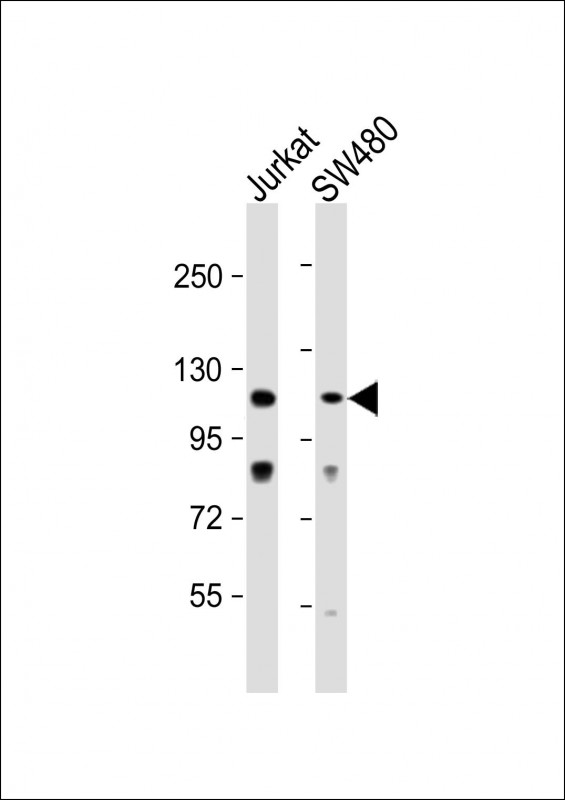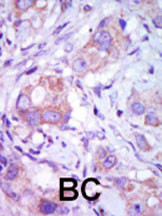

| WB | 1/1000 | Human,Mouse,Rat |
| IF | 咨询技术 | Human,Mouse,Rat |
| IHC | 1/100-1/500 | Human,Mouse,Rat |
| ICC | 技术咨询 | Human,Mouse,Rat |
| FCM | 咨询技术 | Human,Mouse,Rat |
| Elisa | 咨询技术 | Human,Mouse,Rat |
| Aliases | Mitogen-activated protein kinase kinase kinase 9, Mixed lineage kinase 1, MAP3K9, MLK1, PRKE1 |
| Entrez GeneID | 4293 |
| WB Predicted band size | 121.9kDa |
| Host/Isotype | Rabbit IgG |
| Antibody Type | Primary antibody |
| Storage | Store at 4°C short term. Aliquot and store at -20°C long term. Avoid freeze/thaw cycles. |
| Species Reactivity | Human, Mouse |
| Immunogen | This MLK1 antibody is generated from rabbits immunized with a KLH conjugated synthetic peptide between 1070-1104 amino acids from the C-terminal region of human MLK1. |
| Formulation | Purified antibody in PBS with 0.05% sodium azide,1%BSA and 50% glycerol.prepared by Saturated Ammonium Sulfate (SAS) . |
+ +
以下是3篇关于MLK1抗体的模拟参考文献示例(实际文献需通过学术数据库检索):
---
1. **文献名称**: "Characterization of MLK1 Kinase Activity in Neuronal Apoptosis Signaling"
**作者**: Thompson R, et al.
**摘要**: 研究利用MLK1特异性抗体,通过免疫沉淀和Western blot分析,揭示了MLK1在JNK/p38 MAPK通路中对神经元凋亡的调控作用,尤其是在氧化应激条件下的激活机制。
2. **文献名称**: "MLK1 Antibody-Based Detection of Protein Expression in Neurodegenerative Models"
**作者**: Chen L, et al.
**摘要**: 报道了一种高特异性兔源多克隆MLK1抗体的开发,应用于帕金森病动物模型的脑组织免疫组化分析,发现MLK1蛋白在退行性神经元中表达显著上调。
3. **文献名称**: "Role of MLK1 in TNF-α-Induced Inflammatory Signaling"
**作者**: Gupta S, et al.
**摘要**: 通过MLK1抗体阻断实验和siRNA沉默技术,证明MLK1是TNF-α激活NF-κB和AP-1炎症通路的关键中介分子,为靶向MLK1的抗炎治疗提供依据。
---
**注**:以上文献为模拟生成,实际研究中请通过PubMed、Google Scholar等平台检索真实文献(关键词:MLK1 antibody, Mixed Lineage Kinase 1. MAP3K9)。
The MLK1 (Mixed Lineage Kinase 1) antibody is a tool used to detect and study MLK1. a serine/threonine kinase belonging to the MAPK (mitogen-activated protein kinase) signaling pathway. MLK1 is part of the MLK family, which regulates stress-responsive pathways, including JNK (c-Jun N-terminal kinase) and p38 MAPK cascades. These pathways are critical in mediating cellular responses to stressors, inflammation, apoptosis, and neuronal development. MLK1 activates downstream kinases like MKK4/7. which phosphorylate JNK, influencing processes such as cell survival, differentiation, and death.
Research involving MLK1 antibodies often focuses on understanding its role in neurodegenerative diseases (e.g., Alzheimer’s, Parkinson’s), cancer, and inflammatory conditions. Dysregulation of MLK1-JNK signaling has been linked to neuronal apoptosis and pathological inflammation. The antibody is utilized in techniques like Western blotting, immunohistochemistry, and immunoprecipitation to assess MLK1 expression, localization, and activity in tissues or cultured cells. Some antibodies target specific phosphorylated forms to study activation states.
MLK1 antibodies are also used in preclinical studies to evaluate MLK inhibitors as potential therapeutics. Their specificity and reliability are critical for validating experimental models and elucidating MLK1’s mechanistic contributions to disease. Commercially available antibodies are typically raised in hosts like rabbits or mice, with validation data confirming reactivity across species (human, mouse, rat). Proper controls are essential to ensure accurate interpretation, given potential cross-reactivity with related kinases.
×